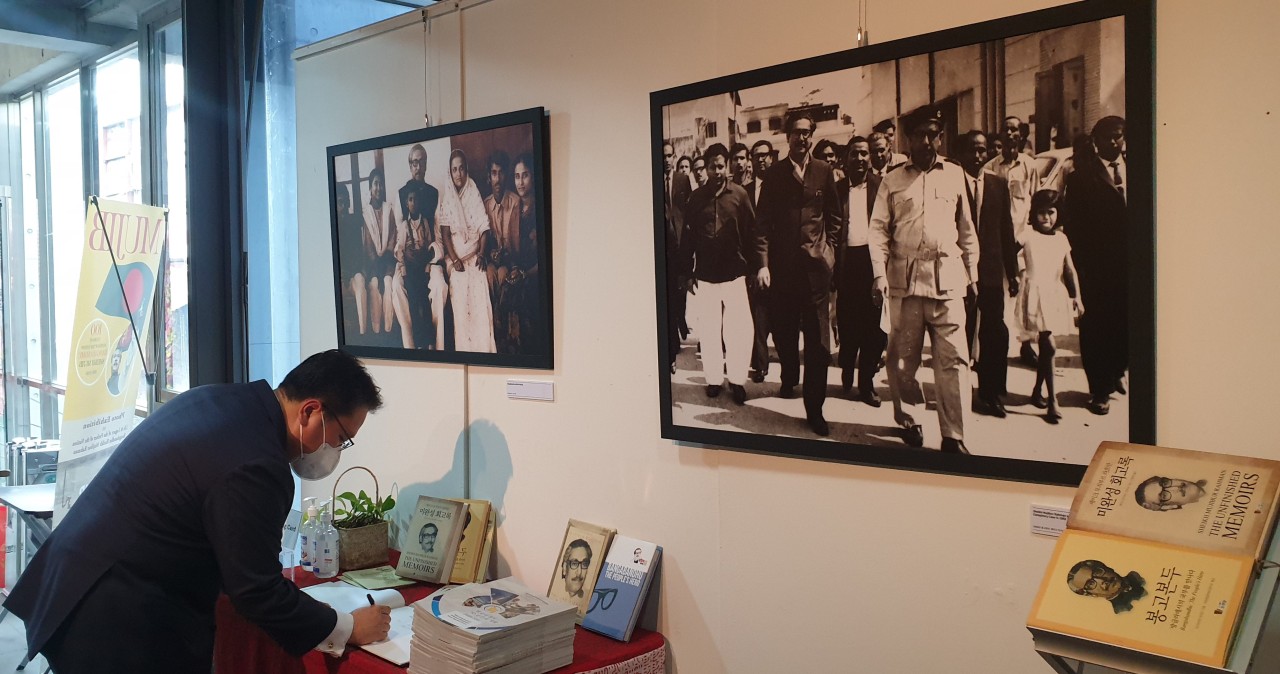 |
A visitor signs the guest book at a photo exhibition celebrating the life and legacy of Bangladesh’s national hero, Sheikh Mujibur Rahman, known as Bangabandhu, last week at a cultural center in Seoul. (Embassy of Bangladesh in Seoul) |
The Embassy of Bangladesh in Seoul celebrated 'Mujib Year' showcasing the life and legacy of the “father of the nation,“ Bangladesh’s first President Bangabandhu Sheikh Mujibur Rahman with a second photo exhibition in Seoul last week.
Bangabandhu, the architect of Bangladesh, proclaimed the Independence of Bangladesh in 1971 and played a significant role in making Bangladesh the136th member of the United Nations.
The embassy co-organized the exhibition, titled “Mujib Year,” at a cultural center in Daehangno, Seoul, with Youngone, an outdoor clothing company with production and outreach programs in Bangladesh.
At the opening, Youngone CEO Sung Ki-hak underlined Bangladesh’s socioeconomic development in recent years.
Bangladesh has made remarkable progress in poverty reduction and has been among the fastest growing economies in the world over the past decade.
Bangladeshi Ambassador Abida Islam presented Sung with a copy of the recently unveiled Korean version of Bangabandhu’s book “The Unfinished Memoirs.”
Islam highlighted Bangabandhu’s political activities and contributions, and said glimpses of his life were well reflected in the photographs displayed at the exhibition.
She said she hoped the photo exhibition would generate interest in Bangabandhu here, especially among young Koreans.
The opening ceremony was attended by Korean nationals as well as Bangladeshis living in Korea. Each guest received a copy of the Korean version of “The Unfinished Memoirs.”
The book was displayed at the exhibition along with other publications on Bangabandhu, such as “Bangabandhu, the People’s Hero” and his historic March 7 speech.
According to UNESCO, the speech constitutes a faithful documentation of how the failure of post-colonial nation-states to develop inclusive, democratic society alienates their population belonging to different ethnic, cultural, linguistic or religious groups and the speech led the people of Bangladesh to independence in 1971.
Documentaries on his life and work will be screened throughout the exhibition, the embassy said.
By Sanjay Kumar (
sanjaykumar@heraldcorp.com)





![[Exclusive] Hyundai Mobis eyes closer ties with BYD](http://res.heraldm.com/phpwas/restmb_idxmake.php?idx=644&simg=/content/image/2024/11/25/20241125050044_0.jpg)
![[Herald Review] 'Gangnam B-Side' combines social realism with masterful suspense, performance](http://res.heraldm.com/phpwas/restmb_idxmake.php?idx=644&simg=/content/image/2024/11/25/20241125050072_0.jpg)

